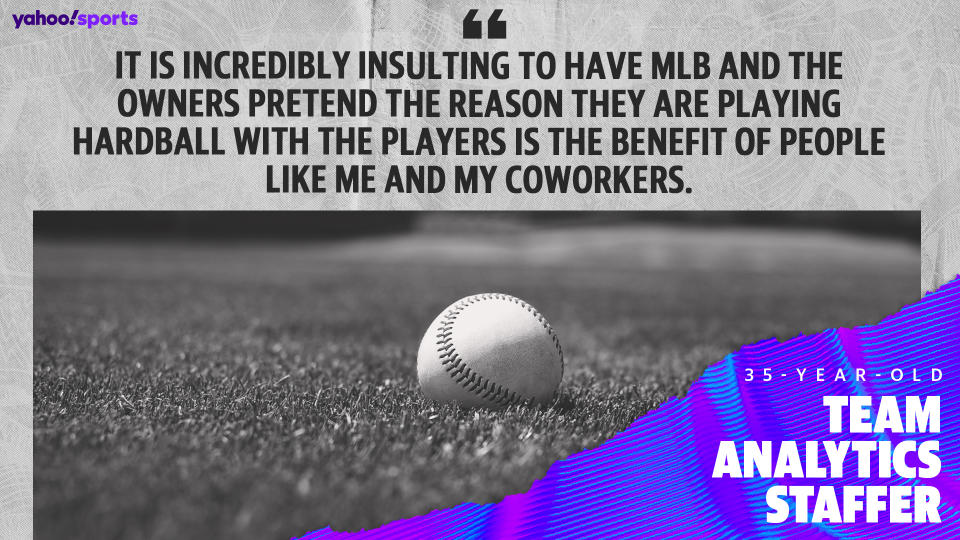MLB, team employees fear for baseball's future as 'ownership is clearly prepared to throw it all away'
If you think you’re frustrated by how nasty and unproductive the negotiations between Major League Baseball and the Major League Baseball Players Association have been the past month, you should hear from the people whose livelihoods depend on the sport.
I don’t mean the baseball players righteously clinging to the ideal of a day's pay for a day's work — especially in a career with such a short shelf life. Nor do I mean the billionaire owners callously exercising every bit of leverage they have — and wantonly crying poor even as their teams skyrocket in value — just to save a little money in the short term.
I’m talking about all the league and team employees, the ones not captured in the dismissive “millionaires vs. billionaires” trope specifically because they don’t have a seat at the table. On top of the global anxiety ushered in by the coronavirus pandemic and the jarring suspension of all sports back in March, they’ve spent the past month watching the immediate security of their jobs and the long-term vitality of their industry fluctuate with each passing “non-starter” proposal or barely concealed threat lobbed through the media.
Commissioner Rob Manfred, who works on behalf of the owners, went back on his statement that there would “100 percent” be a baseball season in 2020 on Monday, infuriating players and worrying fans. Now, those team and league employees who are still working after furloughs hit are nervous about all the uncertainty, annoyed at the lack of internal communication, and disillusioned by the impression that the people in position to save the sport aren’t motivated to do so.
“I say this with the respect and understanding that 112,000 people have died and millions are still unemployed, there are livelihoods of working class people at stake,” said one employee of a National League team. (Sources were granted anonymity to speak honestly without fear of professional repercussions.)

And while the players have the might of a union behind them — variable as that may have been over the years — the people who work desk jobs throughout baseball do so without any such protections. In that way, they’re less beneficiaries of the league’s seat at the table, and more like the minor leaguers who have routinely suffered the consequences of a bargaining dynamic that operates without their interests represented.
“It has been frustrating to watch this entire process play out while being heavily invested and having zero influence,” said a 35-year-old team analytics staffer.
“The problem with positioning it as ‘millionaires vs. billionaires’ is that it's not zero-sum. The billionaires will take the money from the pockets of minor league players, front office staff, back office staff, stadium staff, etc.,” said an analytics employee with a different organization. “S--- always rolls downhill. People with five-figure salaries suffer while the people with eight-figure salaries squabble with the billionaires.”
That particular employee was concerned that, by not accepting further pay cuts beyond prorated salaries — and having the solidarity and likely the legal standing to defend that position as a union — the players are essentially just passing the economic pain down to people making less money.
“The owners can cut our salaries at any time,” he said. “There's nothing we can do about it.”
He blamed the players’ obstinance for his potential precarity, but virtually everyone else who spoke to Yahoo Sports said that either both sides are to blame or, overwhelmingly, that the owners are at fault.
After the players indicated that they wouldn’t produce another proposal, and instead invited the league to simply tell them “when and where” to show up for a shortened season, the league snapped back in a statement. As part of its “disappointment” with the MLBPA, the league said that it “is not fair to the thousands of other baseball employees that Clubs and our office are supporting financially during this difficult 2020 season.”

That point, although seemingly issued in defense of the many office employees, rankled the 35-year-old analytics staffer.
“It is incredibly insulting to have MLB and the owners pretend the reason they are playing hardball with the players is the benefit of people like me and my coworkers,” the staffer said.
Even a member of the league’s technology office said, “It’s obvious from both the proposals and the cadence at which they’re issued that one side is trying to negotiate in good faith and it’s not the league office.”
That employee is particularly aggravated that the league would fight for fewer baseball games, and risk long-term acrimony, to keep from spending what amounts to “a fraction” of the 2017 sale of BAMTech for $1.58 billion. Those gains — a roughly $50 million windfall per team — along with things like a new postseason deal with Turner Sports reportedly worth a billion dollars are not shared with the players directly. So why should the players subsidize the losses in a down year?
The league technology office staffer said nothing about this process was really surprising — that is until Manfred walked back his assurance that a season would happen. In a letter to the union, the league seemed to say that it would not issue a schedule unless the MLBPA waived the right to grieve the details of said schedule.
“I didn’t expect ownership to threaten to cancel the season out of spite,” the technology staffer said. “I don’t really know what to say about it. It’s exhausting for so many of us to work this hard for something when ownership is clearly prepared to throw it all away.”
Team employees were worried that a shortened season of 50-ish games imposed by the league would potentially suffer from stars sitting out or simply a lack of engagement among players, who might not be motivated to participate in media or marketing events. But the prospect of no season at all is far worse.
“I think the only good part of the 48-50 game season is that it means we avoided being the only league to not start back up,” said the NL employee. “If we lost a whole season while other leagues didn’t … wow.”
The owners’ willingness to nickel-and-dime the season into non-existence — in conjunction with things like a shortened draft and a push to drastically shrink the minor leagues — has left some people who work in the industry feeling “inadvertently complicit” in a system that's sacrificing the goodwill of the talent at every level.
“As far as my job, it makes it tough to be associated with it all,” said one front office employee in their 30s. “This has all made me rethink my interest and passion for the sport.”
Almost everyone who spoke to Yahoo Sports expressed concern that the tenor of the current negotiations was an inauspicious omen for the next few seasons as baseball navigates the pandemic and faces the expiration of the collective bargaining agreement after the 2021 season, which was already shaping up to be a contentious showdown.

“The PA and league’s relationship is so sour. 2020 will be awkward. 2021 will be tense. I don’t see how the CBA talks don’t end in a lockout or strike,” said a team marketing employee.
This season, 2020, will be short and weird if it happens at all. It remains possible that COVID-19 precautions could limit the fan experience even during the 2021 season. And the 2022 season that follows a CBA renegotiation is looking increasingly likely to be stalled by a work stoppage if the ill will from the current labor disagreement is left to fester. That’s potentially three subpar seasons — plus a cheating scandal that turned the game against itself — between the Washington Nationals hoisting their World Series trophy and unmitigated baseball.
“This has been a PR nightmare for a game that has already slipped into third place in the American sports-fan consciousness,” said a digital media producer for an NL team. “Baseball could be in free fall.”
“I'm still confident that I'll be able to do what I love for the game I love,” the producer said, “but there are certainly seeds of doubt that weren't there before.”
People working in marketing, analytics and technology all stipulated that their own careers could likely go on without baseball if the industry becomes unsustainable or career advancement is indefinitely stymied. They expressed more concern, however, about the future for baseball lifers, people whose skills are specific to the sport, as well as those already in vulnerable positions, like stadium staff and minor league employees.
“There are people who have spent decades playing and coaching baseball. Many of these people don’t have a college degree,” said the 35-year-old analytics employee. “Their only choice is to either sit on unemployment or give up their career, enter a general workforce that has the highest unemployment rate in a century, and do it while only equipped with a resume filled with baseball-specific skills.”
And after all the animosity accrued during the shutdown — during which some teams had to be publicly shamed into paying out their monthly pittance to minor leaguers — “I would guess that those with options will choose to not be a part of this game,” another front office employee said.
With opening day seemingly no closer — and if anything less assured — than it was at the start of the negotiations, and after several weeks of unsavory insight in the owners’ priorities, already people whose marketable skills might transfer are looking to get out.
“I was working on a cover letter for an NBA job before this,” said the 35-year-old analytics employee.
Hannah Keyser is a reporter at Yahoo Sports. Have a tip? Email her at Hannah.Keyser@yahoosports.com or reach out on Twitter at @HannahRKeyser.
More from Yahoo Sports:

